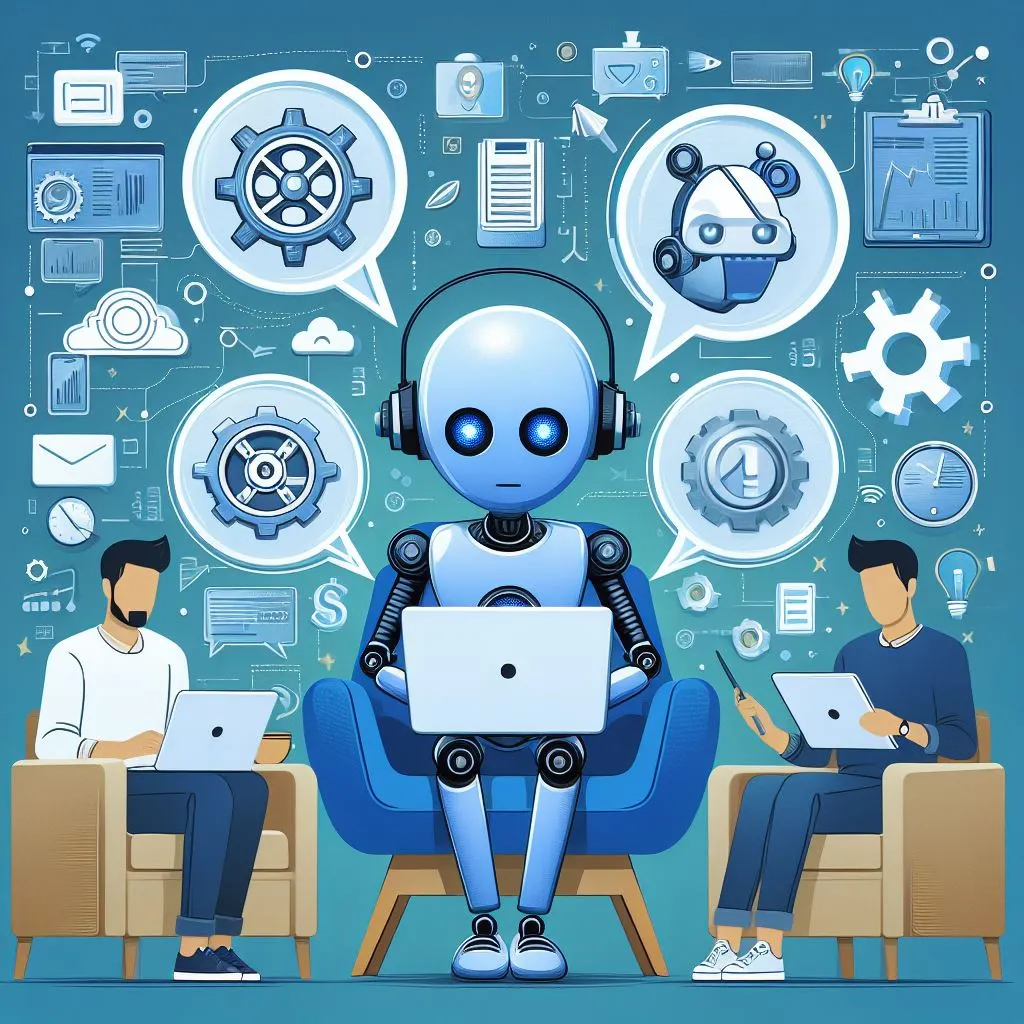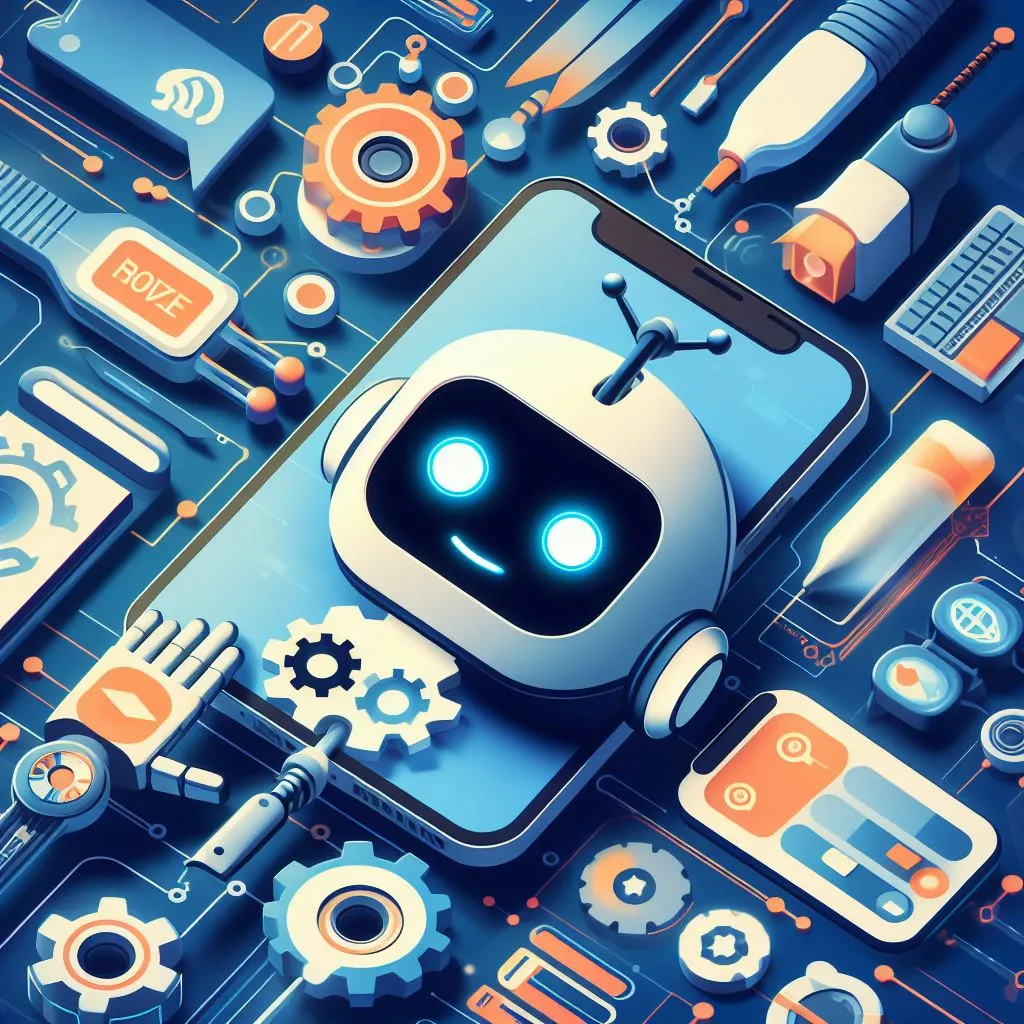In today’s fast-paced digital landscape, businesses are constantly seeking ways to streamline their operations and enhance customer experiences. One powerful tool that has emerged to address these challenges is chatbot automation. Chatbots are computer programs or AI-driven systems that engage in text or voice-based conversations with users, without requiring direct human intervention.
What is Chatbot Automation?
Chatbot automation involves the use of these conversational AI systems to handle a wide range of customer interactions, from answering product inquiries to providing sales support and customer service. By leveraging technologies like natural language processing (NLP) and machine learning, chatbots can understand user intent, access relevant data sources, and deliver personalized responses in real-time.
Benefits of Chatbot Automation

1. 24/7 Customer Support
Chatbots never sleep, never get sick, and never need breaks. They can provide round-the-clock customer support, ensuring that your clients’ needs are addressed promptly, no matter the time of day or day of the week. This can lead to improved customer satisfaction and reduced wait times.
2. Handling Multiple Inquiries Simultaneously
As businesses grow, the number of customer inquiries can become overwhelming for human customer service teams. Chatbots, on the other hand, can handle multiple customer interactions simultaneously, providing quick and accurate responses without the limitations of human staff.
3. Reduced Risk of Human Error
Chatbots are programmed to operate with a high degree of accuracy, eliminating the risk of human errors that can occur in customer service interactions. This can lead to fewer mistakes, better data integrity, and a more consistent customer experience.
4. Lead Generation and Qualification
Chatbots can be utilized to engage with potential customers, collect contact information, and qualify leads, making the sales process more efficient and effective. By automating these tasks, businesses can free up their sales teams to focus on closing deals and building stronger customer relationships.
5. Improved Marketing Effectiveness
Chatbots can be integrated with marketing campaigns to provide personalized product recommendations, offer promotional discounts, and gather valuable customer insights. This can help businesses better understand their target audience and tailor their marketing strategies accordingly.
6. Multilingual Capabilities
Chatbots can be designed to communicate in multiple languages, allowing businesses to expand their reach and serve customers from diverse backgrounds. This can be particularly beneficial for companies operating in global markets or targeting international customers.
7. Cost Savings
By automating various customer service and sales tasks, businesses can reduce the need for additional human resources, leading to significant cost savings. Chatbots can handle routine inquiries and tasks without the overhead associated with hiring and training customer service representatives.
Chatbot Automation in Different Industries

Chatbot automation is proving to be beneficial across a wide range of industries, each with its unique challenges and requirements. Let’s explore some of the key applications:
Ecommerce
In the rapidly growing ecommerce sector, chatbots can play a crucial role in enhancing customer service, streamlining the sales process, and reducing shopping cart abandonment rates. Chatbots can provide instant responses to customer inquiries, guide them through the purchasing journey, and even handle order-related tasks.
Healthcare
Healthcare organizations are leveraging chatbots to improve patient engagement, streamline administrative tasks, and provide 24/7 medical assistance. Chatbots can be used to triage patients, schedule appointments, provide medication reminders, and offer mental health support.
Real Estate
In the real estate industry, chatbots can help streamline the property search process, schedule viewings, and provide potential buyers with detailed information about listings. Chatbots can also assist in gathering leads, handling routine inquiries, and improving the overall customer experience.
Financial Services
Financial institutions are utilizing chatbots to enhance customer service, provide financial advice, and automate various banking tasks. Chatbots can help customers check account balances, make payments, and even apply for loans or credit cards.
Hospitality
The hospitality industry has embraced chatbot automation to improve guest experiences, handle reservations and check-ins, and provide personalized recommendations. Chatbots can assist guests with amenity requests, provide local recommendations, and even handle post-stay feedback and reviews.
Implementing Chatbot Automation

Implementing a successful chatbot automation strategy requires careful planning and consideration. Here are some key steps to follow:
- Identify Customer Needs: Understand your target audience and the common pain points they experience when interacting with your business. This will help you determine the most valuable use cases for your chatbot.
- Define Chatbot Objectives: Clearly define the specific goals you hope to achieve with your chatbot, such as improving customer satisfaction, increasing sales, or streamlining administrative tasks.
- Choose the Right Chatbot Platform: Evaluate various chatbot platforms and select the one that best fits your business needs, considering factors like customization, integration capabilities, and self-learning features.
- Design Conversational Flows: Develop natural-sounding conversational flows that address your customers’ queries and guide them towards the desired outcomes, such as making a purchase or scheduling an appointment.
- Integrate with Existing Systems: Ensure your chatbot seamlessly integrates with your existing customer relationship management (CRM) tools, ecommerce platforms, and other relevant systems to create a cohesive and efficient customer experience.
- Continuously Optimize and Improve: Regularly monitor your chatbot’s performance, gather customer feedback, and make iterative improvements to enhance its capabilities and better serve your customers.
Best Practices for Chatbot Automation
To ensure the success of your chatbot automation efforts, consider the following best practices:
- Prioritize User Experience: Design your chatbot’s interface and conversation flows with a focus on user-friendliness and ease of use. Ensure clear and concise communication, and provide a natural, conversational experience.
- Leverage AI and NLP: Invest in advanced natural language processing (NLP) and machine learning technologies to enable your chatbot to understand user intent, provide relevant responses, and continuously improve its capabilities.
- Ensure Data Security and Privacy: Implement robust data security measures to protect customer information and comply with relevant data privacy regulations, such as GDPR or CCPA.
- Provide Seamless Handoffs to Human Agents: Develop a smooth transition process for when a customer’s query requires escalation to a human customer service representative, ensuring a seamless and efficient experience.
- Continuously Monitor and Improve: Regularly analyze chatbot performance metrics, gather user feedback, and make iterative improvements to enhance the chatbot’s capabilities and better serve your customers.
Best automated chatbot solutions
1. Lyro
Developed by Tidio, Lyro is one of the most advanced chatbot automation services available. It is powered by deep learning and AI technologies to enhance customer support and boost sales. This intelligent AI chatbot engages visitors on your website, seamlessly continuing the conversation in a natural manner.
Key Features:
- Natural Language Processing (NLP) chatbots
- Ability to train itself using company information
- Understanding of the context and intent of messages
- Conversational bot templates available
- Ability to understand the context and intent of messages
- Various chat triggers for bots
Pricing:
- Free
- Email marketing ($10/mo)
- Starter ($29/mo)
- Automation ($29/mo)
- Growth ($59/mo)
- Lyro AI ($39/mo)
- Tidio + (starting from $394/mo)
2. Zendesk
Zendesk allows you to monitor, manage, and respond to website visitors while on the go. It is used by companies of all sizes to personalize the shopping experience and increase customer satisfaction. Zendesk also includes a ticketing system, custom forms, automated workflows, and auto-responder functionality to reduce your response times.
Pros:
- Cross-channel support, including mobile apps, social channels, and website AI tools that suggest responses and recognize user intent
- Reporting and analytics to enhance the customer experience
Cons:
- Steep learning curve
- Some users reported bugs while using the software
Pricing:
- Free 30-day trial available
- Suite Team ($55/mo/agent)
- Suite Growth ($89/mo/agent)
- Suite Professional ($115/mo/agent)
- Suite Enterprise –> Contact sales
3. Drift
Drift is an automated chat platform that can provide excellent assistance to your customer success and sales teams. With AI-powered chatbots, Drift can help offer a personalized user experience to your shoppers. It also comes with email automation functionality to help with onboarding new clients and expanding marketing campaigns.
Pros:
- Multiple integrations, including Zapier, HubSpot, and MailChimp
- Real-time insights into website visitors’ needs
- A mobile app for Android and iOS available
Cons:
- Client support available only via chat
- Some reviewers had issues with the reporting features
Pricing:
- Premium ($2,500/mo)
- Advanced and Custom plans –> Contact sales
These are some of the best automated chatbot solutions available in the market, each with its unique features and capabilities to cater to different business needs. When choosing the right chatbot platform, it’s essential to evaluate your specific requirements and select the one that aligns best with your goals and budget.
The Future of Chatbot Automation

As artificial intelligence and natural language processing technologies continue to advance, the potential of chatbot automation is poised to grow exponentially. In the years to come, we can expect to see chatbots becoming increasingly sophisticated, capable of handling more complex tasks and seamlessly integrating with a wider range of business systems and applications.
Some emerging trends in chatbot automation include:
- Conversational AI Assistants: Chatbots will evolve into more intelligent and personalized virtual assistants, capable of engaging in natural, context-aware dialogues and providing tailored recommendations and solutions.
- Multimodal Interactions: Chatbots will integrate with various communication channels, such as voice, video, and augmented reality, to create even more immersive and engaging customer experiences.
- Predictive Analytics and Personalization: Chatbots will leverage advanced data analytics and machine learning to anticipate customer needs, offer proactive recommendations, and personalize interactions based on user preferences and behaviors.
- Intelligent Process Automation: Chatbots will be capable of automating more complex, end-to-end business processes, reducing the need for manual intervention and improving overall operational efficiency.
- Ethical and Transparent AI: As chatbot technology becomes more prevalent, there will be an increased focus on ensuring the ethical and transparent development and deployment of these systems, addressing concerns related to bias, privacy, and accountability.
Conclusion
Chatbot automation is revolutionizing the way businesses interact with their customers, streamlining operations, and driving innovation across a wide range of industries. By embracing this transformative technology, organizations can enhance customer experiences, boost productivity, and gain a competitive edge in the digital landscape.
As the capabilities of chatbots continue to evolve, the future of customer engagement and business automation is poised to become increasingly intelligent, personalized, and efficient. By staying ahead of the curve and strategically implementing chatbot automation, businesses can position themselves for success in the years to come.
FAQ’s
1. Are chatbots limited by number?
The number of chatbots you can have is usually not limited, but the number of active chatbots in operation may depend on the pricing plan you select with your chatbot provider. Most platforms allow you to create as many chatbots as you need, but the active bots running at any given time are limited by your subscription.
2. Where can a chatbot be installed?
Chatbots can be installed on various platforms, including private websites, direct messaging apps, social media brand pages, and even within other business applications through integrations. The versatility of chatbots allows them to be deployed across multiple touchpoints where customers interact with your brand.
3. When can I launch a chatbot?
You can launch a chatbot once you have built and thoroughly tested it for accuracy and performance. It’s important to ensure your chatbot is delivering the right responses and providing a seamless customer experience before making it live. Many providers recommend extensive testing and refinement before the official launch.
4. What if I don’t have a website?
Even without a website, you can still utilize chatbot automation through other channels like social media, messaging apps, or third-party platforms. Many chatbot solutions offer the ability to integrate with a variety of platforms, allowing you to engage with customers and automate interactions even without a dedicated website.
5. How do I measure how successfully my chatbot automation is working?
You can measure the success of your chatbot automation by tracking key metrics such as customer service inquiries handled, sales figures, conversion rates, and customer satisfaction scores. These metrics can help you assess the chatbot’s impact on your business operations and customer experience.
6. Do I have to know a lot about computer coding?
No, you don’t need extensive coding knowledge to implement chatbot automation. Many chatbot platforms offer no-code or low-code solutions, allowing you to build and deploy chatbots using visual editors and pre-built templates, without requiring advanced programming skills.


